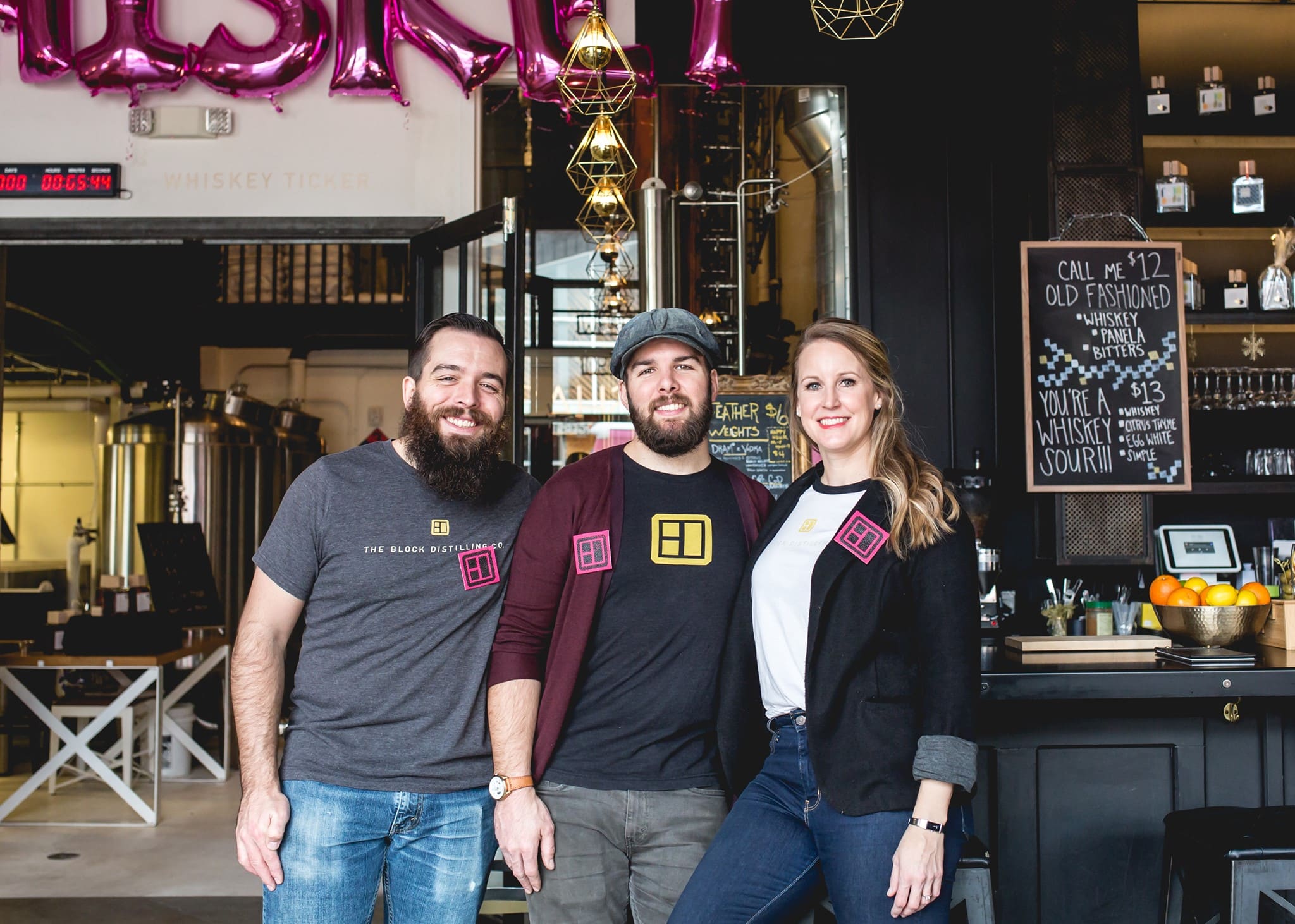
The Block Distilling Co. owners Kameron, Kraig and Michelle Weaver. (Courtesy The Block Distilling Co.)
A RiNo distillery is extending its reach beyond the block.
Two years after raising capital to expand production and extend its real estate at 2990 Larimer St., The Block Distilling Co. is raising money again to bring its spirits out of state for the first time.
“It’s really what we knew was our goal from the beginning,” co-owner Kraig Weaver said.
Weaver said about 27 percent of the $1.4 million Block did in sales last year was from wholesale.
Distribution to Texas has already started, and Weaver said the business expects to add California, Florida, Nevada and New York by the end of summer. He and his co-owners — wife Michelle and brother Kameron — are looking to raise up to $600,000 on Wefunder to do that, with $13,430 already raised.
The 7-year-old distillery has raised roughly $3.4 million to date, which includes $675,000 through Wefunder in 2021. That money went toward adding 4,000 square feet to the RiNo taproom — giving it a total of 10,000 — and increasing production.
That expansion was one reason The Block decided to raise through Wefunder again. Weaver said because the extra real estate and capacity increased The Block’s expenses, it makes the distillery less desirable to traditional bankers and angel investors.
“Those can be hard to obtain depending on where the company is in its growth strategy,” Weaver said.
With Wefunder, which falls under the Securities and Exchange Commission’s Regulation Crowdfunding (Reg CF), non-accredited individuals can invest smaller amounts in companies.
Reg CF, which Weaver described as a “game changer” for startups, went into effect in 2015. Before Reg CF, crowdfunding did not include equity investments but rather prepaying for a product still in development (think Kickstarter).
“Tons of small businesses saw that happening and wished there was a way to do that for themselves,” Weaver said.
But those that weren’t creating a retail product and couldn’t attract traditional angel investors were out of luck. And so was Weaver, who has a finished product but can’t mail it around the country to those potential backers because of liquor laws.

The Block Distilling operates at 2990 Larimer St. (BusinessDen file)
Sites such as Wefunder helped solve that problem, and also gave individuals such as Kara Johnson-Hufford a way to dip a toe into equity investing. Before investing $5,000 in The Block’s first Wefunder raise, Johnson-Hufford and her wife, Randi, had invested only in an Angus beef ranch in Oregon that her parents owned.
“With some investment opportunities there’s a particular entry point or threshold that might be prohibitive,” Johnson-Hufford said.
Wefunder, meanwhile, is “user-friendly” and doesn’t require a huge cash investment, she said. The Block’s minimum investment for its current round is $500.
And Johnson-Hufford said she gets frequent updates directly from The Block that detail progress with the company. They also receive annual reports, which outline dividends.
Ultimately, the couple decided to invest in the distillery because they’re fans and believed in its business plan. Johnson-Hufford said they haven’t invested in any other businesses through Wefunder yet, but are happy with their decision to back The Block.
“We wanted to be able to buy in and support,” she said. “We think really highly of the three of them as individuals, as well as a small local business … My spouse and I believe in investing in that.”
Which, Weaver said, is another reason the company likes raising money through the site.
“We also like having equity holders that are really attached to the brand and supportive of the brand,” Weaver said. “Reg CF really just lets us market it to a different potential group of investors.”

The Block Distilling Co. owners Kameron, Kraig and Michelle Weaver. (Courtesy The Block Distilling Co.)
A RiNo distillery is extending its reach beyond the block.
Two years after raising capital to expand production and extend its real estate at 2990 Larimer St., The Block Distilling Co. is raising money again to bring its spirits out of state for the first time.
“It’s really what we knew was our goal from the beginning,” co-owner Kraig Weaver said.
Weaver said about 27 percent of the $1.4 million Block did in sales last year was from wholesale.
Distribution to Texas has already started, and Weaver said the business expects to add California, Florida, Nevada and New York by the end of summer. He and his co-owners — wife Michelle and brother Kameron — are looking to raise up to $600,000 on Wefunder to do that, with $13,430 already raised.
The 7-year-old distillery has raised roughly $3.4 million to date, which includes $675,000 through Wefunder in 2021. That money went toward adding 4,000 square feet to the RiNo taproom — giving it a total of 10,000 — and increasing production.
That expansion was one reason The Block decided to raise through Wefunder again. Weaver said because the extra real estate and capacity increased The Block’s expenses, it makes the distillery less desirable to traditional bankers and angel investors.
“Those can be hard to obtain depending on where the company is in its growth strategy,” Weaver said.
With Wefunder, which falls under the Securities and Exchange Commission’s Regulation Crowdfunding (Reg CF), non-accredited individuals can invest smaller amounts in companies.
Reg CF, which Weaver described as a “game changer” for startups, went into effect in 2015. Before Reg CF, crowdfunding did not include equity investments but rather prepaying for a product still in development (think Kickstarter).
“Tons of small businesses saw that happening and wished there was a way to do that for themselves,” Weaver said.
But those that weren’t creating a retail product and couldn’t attract traditional angel investors were out of luck. And so was Weaver, who has a finished product but can’t mail it around the country to those potential backers because of liquor laws.

The Block Distilling operates at 2990 Larimer St. (BusinessDen file)
Sites such as Wefunder helped solve that problem, and also gave individuals such as Kara Johnson-Hufford a way to dip a toe into equity investing. Before investing $5,000 in The Block’s first Wefunder raise, Johnson-Hufford and her wife, Randi, had invested only in an Angus beef ranch in Oregon that her parents owned.
“With some investment opportunities there’s a particular entry point or threshold that might be prohibitive,” Johnson-Hufford said.
Wefunder, meanwhile, is “user-friendly” and doesn’t require a huge cash investment, she said. The Block’s minimum investment for its current round is $500.
And Johnson-Hufford said she gets frequent updates directly from The Block that detail progress with the company. They also receive annual reports, which outline dividends.
Ultimately, the couple decided to invest in the distillery because they’re fans and believed in its business plan. Johnson-Hufford said they haven’t invested in any other businesses through Wefunder yet, but are happy with their decision to back The Block.
“We wanted to be able to buy in and support,” she said. “We think really highly of the three of them as individuals, as well as a small local business … My spouse and I believe in investing in that.”
Which, Weaver said, is another reason the company likes raising money through the site.
“We also like having equity holders that are really attached to the brand and supportive of the brand,” Weaver said. “Reg CF really just lets us market it to a different potential group of investors.”
